

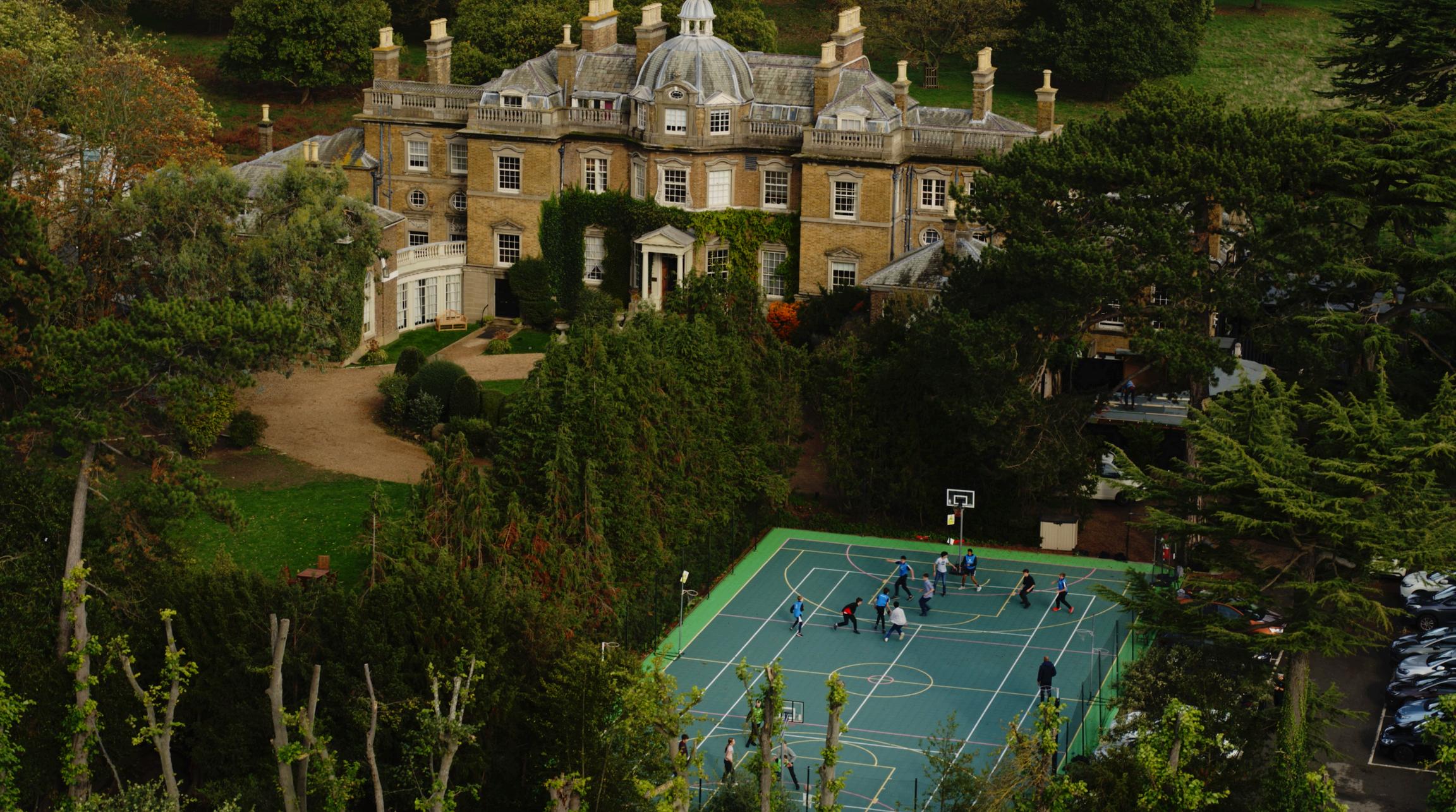










At Hampton Court House Senior, we take pride in the breadth and depth of our curriculum. Our commitment to providing an exceptional educational experience for your child is at the heart of everything we do. We know that every child is unique, and so we tailor our approach to ensure that each individual thrives academically, socially, and personally. While our curriculum is carefully planned, we are also strong believers in adaptive teaching that responds to the needs and interests of our students. Therefore, whilst our core curriculum is outlined here for all students, the way in which it is delivered and the depth in each subject will vary to ensure your child gets the very best educational experience. Lessons are designed to be not only informative but also interesting, engaging, supportive, and challenging. Our teachers enable children to actively participate in lessons, learn, and demonstrate new knowledge, skills, and ideas. We believe in empowering our students to shape their own voices within our dynamic yet nurturing community.
The curriculum for Years 7 – 9 at Hampton Court House is designed to deepen children’s knowledge and understanding while developing approaches to critical thinking, creativity, and independence. We aim to provide a challenging and stimulating learning environment that encourages children to explore their interests and develop their strengths whilst creating a setting where mistakes are allowed, and questions are welcomed. Our intent is to prepare children for GCSE’s, A levels and beyond with a skillset that allows them to make the most of any opportunities afforded to them, taken with a global perspective.
Our curriculum implementation for Years 7 – 9 involves a diverse range of teaching strategies and learning experiences. We emphasise subject-specific expertise and interdisciplinary connections through both lessons and a comprehensive programme of extra-curricular activities to ensure both breadth and depth that both enrich the curriculum and promote intellectual curiosity. Teachers use formative and summative assessments to guide instruction and provide constructive feedback on a half termly basis whilst additionally imbuing in them the techniques needed ultimately to respond to GCSE style questions. Where needed, we also offer open subject clinics to help address individual learning needs and foster academic excellence.
The impact of our curriculum for Years 7 – 9 is reflected in the high level of academic achievement and personal development of our students. Typically, at least one grade higher compared to matched peers nationally at GCSE. They demonstrate proficiency in advanced subject areas, strong analytical and research skills, and a readiness to tackle complex challenges whilst not being afraid to make mistakes. Our students show increased confidence, leadership abilities, and a sense of community responsibility. They immerse themselves in Drama and the Arts, performing, creating, and representing the school in many ways. Ultimately, they are confident to embark on their GCSE programmes with a sense of purpose and belief, safe in the knowledge they will be supported as they enter then next phase of their education.
Katy Deacon Head of Secondary kde@hchnet.co.uk
Eldon Fayers Assistant Principal | Teaching & Learning efa@hchnet.co.uk
Nick Edwards Assistant Principal | Data & Assessment ned@hchnet.co.uk
Paul Pearce
Deputy Head | Operations & Academic pgp@hchnet.co.uk
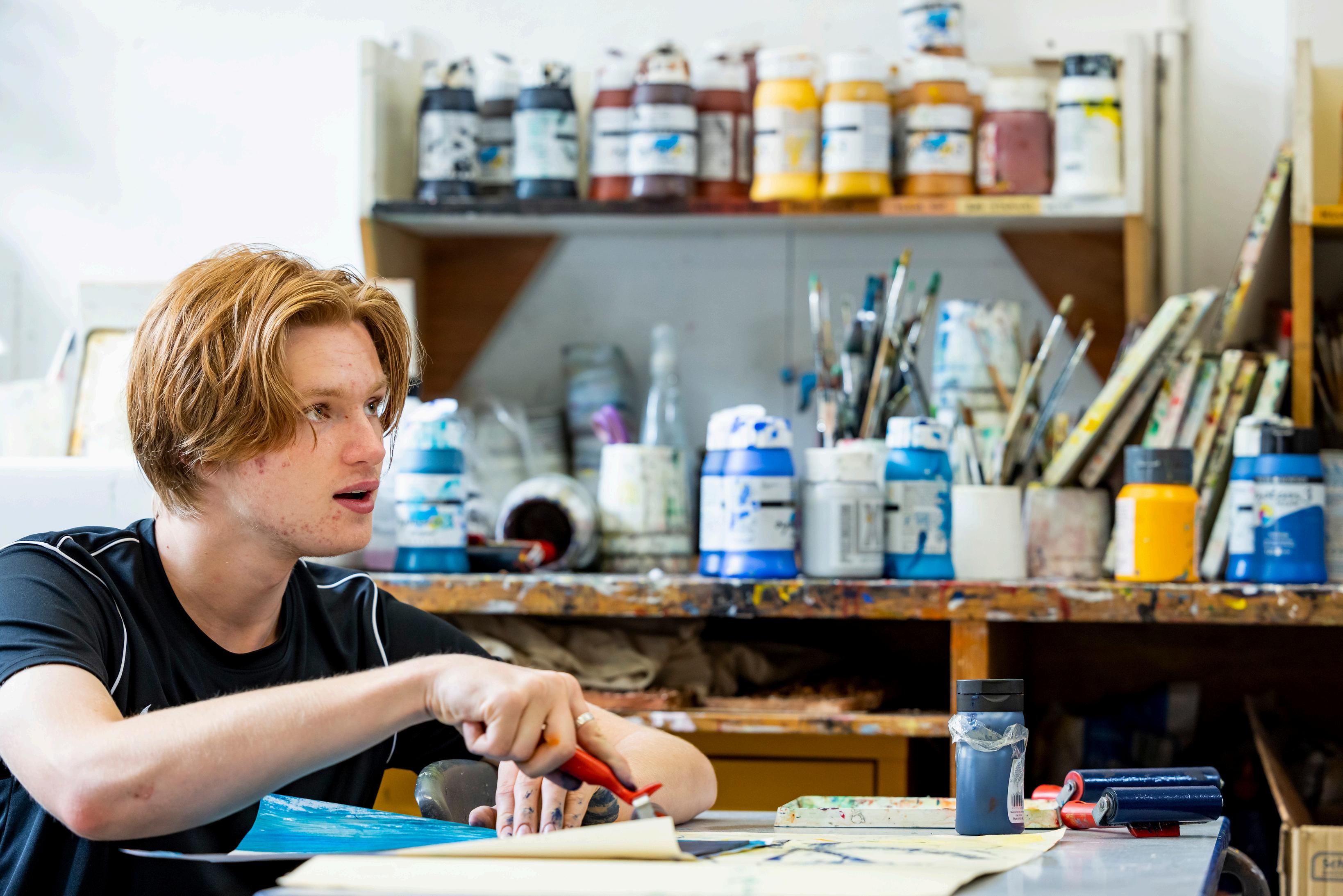

This unit introduces the students to modelling with wire, modroc and found objects. Inspiration is taken from the French sculptor Edouard Martinet and the American Joan Danziger who create insect sculptures with beautiful forms and colours. The students will research and design their own insect, incorporating found and recycled objects, and complete
Student work is assessed during the lessons with practical help offered when necessary Understanding is assessed gradually as they progress because students learn by doing Students are also encouraged to self-assess through refining their own work and reflecting on each other's Their memory and understanding of processes are assessed through write ups which they are asked to document in their sketchbooks at the end of each project
Term
Autumn 1 Graphic design
Autumn 2
Spring 1 and 2
Interaction of colours.
What are we studying?
Summer 1 and 2
Looking at the work of Josef Albers, students reinforce their knowledge of the properties of colours And study how colour and tone create form how context changes appearance
Continuation with colour studies
Looking at the work of German Expressionist painter Gabrielle Munter students will study: complementary palettes how to create harmony through limited palettes the use and effects of cloissonism
Students will be working throughout this term with acrylic paint
Insect Sculptures
Inspiration from sculptors who use found objects
Design ideas, form, pattern and colours
Collect small, recycled items to incorporate Use of wire and cutting tools to construct a structural framework
Build up using newspaper and modroc
Complete using acrylic paint
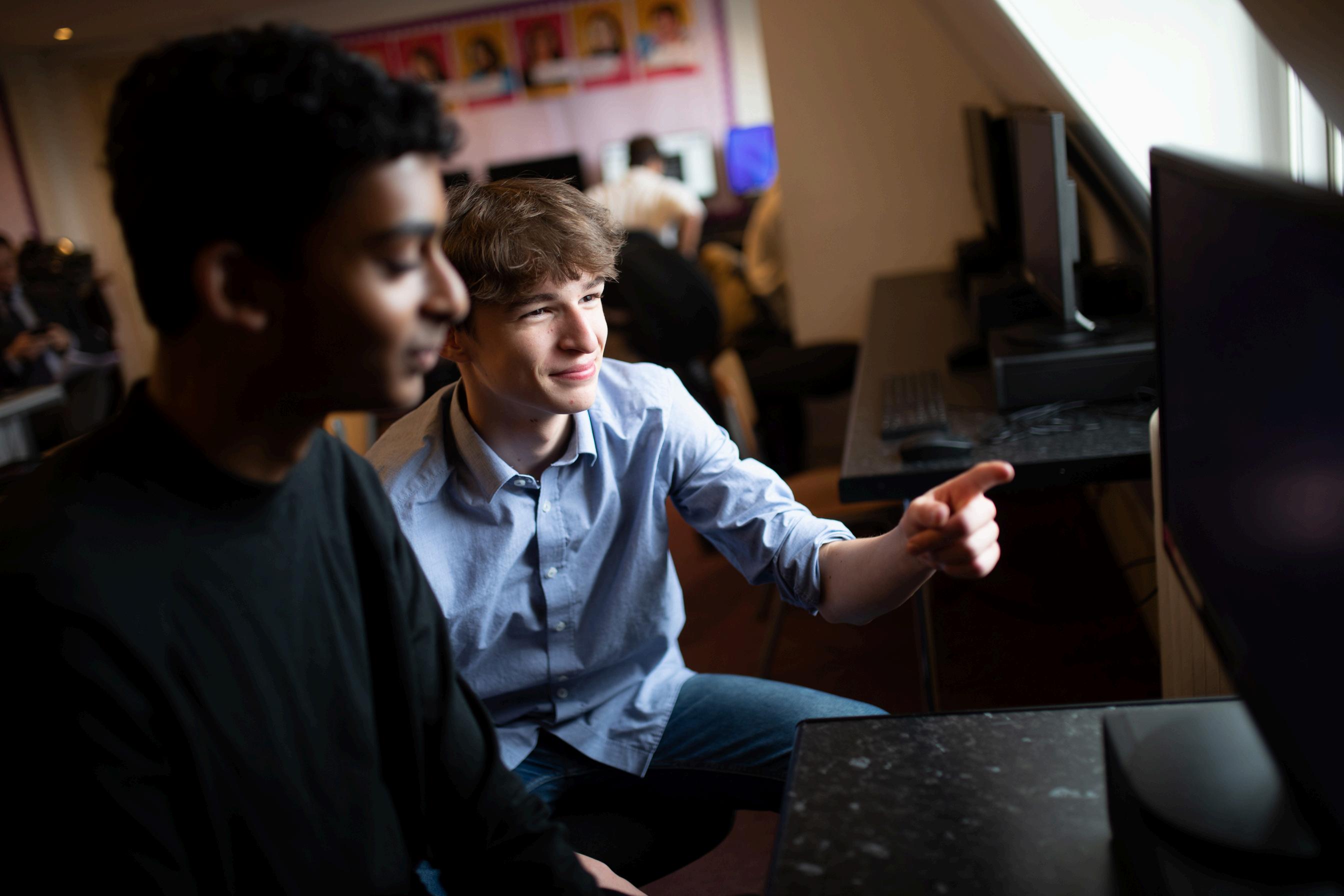

The syllabus in Year 8 includes materials and concepts recommended by the National Centre for Computing Education for Key Stage 3, as well as topics and resources from other established and respected educational organisations. The activities alternate each half-term between predominantly theory topics and then more practical applications. This ensures the students have hands-on experience of early programming concepts, as well as building an understanding of the wide scope and complexity of the subject. In the theory periods, gamified learning will also be used to illustrate and embellish the topics to maintain student engagement, and in the more practical sessions, students will be required to maintain a log of their activities, which will form part of their assessment.
Each half term there will be a mini test on the topics covered that half term. These will take place online during normal lessons. At the end of the year there will be an end of year exam covering all the topics from the whole year. This will be during the school’s assessment week. Throughout the year, each student’s written work - completed entirely in Teams/Class Notebook – will be considered in the assessment of their progress.
Term
Autumn 1
Autumn 2
Spring 1
Spring 2
Summer 1
Summer 2
What are we studying?
The year starts with a quick look at the ancient history of computing before moving into the modern-day hardware, CPU and operating systems, and then considering the importance of formal logic, before exploring whether AI means that computers can think.
After half-term, we will start with Python – the programming language of choice for education, data science and even machine learning. The initial course will cover the basic concepts of variables, data types, selection, iteration and search algorithms. The learning will be accessible for novices and those with some prior exposure to programming.
In the new year we will move onto data representation: bits and their storage and transmission. This unit also includes learning the binary number system. We will be dipping back into Python occasionally too.
The second half of the spring term will be taken up with more Python programming –recapping the basic concepts before moving onto more loops, functions and lists.
After Easter students will be studying cybersecurity: scams, misuse, protecting personal data, and piracy and copyright.
In the final half of the summer term, students will have the opportunity to write their own textbased adventure game in Python, as well as revise the topics for the end of year assessment.`
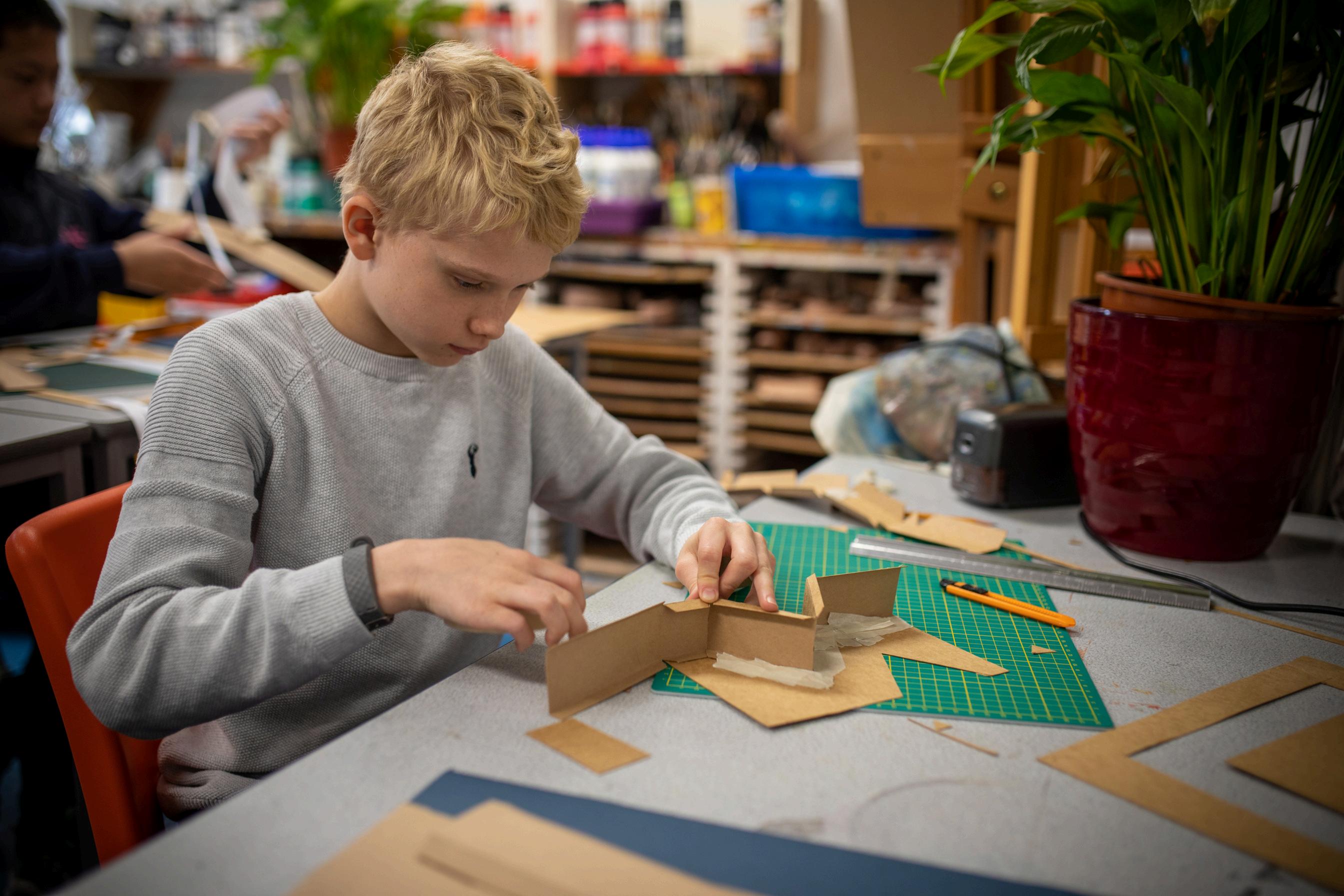

During the summer term, Year 8 students will embark on a Micro Home Design Project, drawing inspiration from modular and prefabricated architecture as a response to the global housing crisis. This project will introduce students to real-world design challenges, helping them understand how architects and designers address issues such as urban density, sustainability, and affordability.
Through research and exploration, students will generate realistic design proposals, considering a range of critical design specifications, including environmental impact, client needs and values, cost-effectiveness, and safety regulations. They will learn to apply design communication techniques, refining their ideas into a final Micro Home design—a compact structure that integrates into existing urban spaces in innovative ways.
To deepen their understanding of construction materials and technologies, students will explore the properties, sources, and applications of various materials relevant to small-scale architectural design. They will follow the iterative design process, continuously developing, testing, and evaluating their concepts to refine their final proposals. Additionally, students will study specialist technical principles, focusing on how papers and boards can be used to create scaled models of their designs while maintaining safe working practices in the workshop.
In the second half of the term, students will advance their digital design skills by learning to use Blender, an industry-standard 3D design software. They will also be introduced to 3D printing technology, gaining hands-on experience in modern fabrication techniques and understanding how digital tools are shaping the future of architecture and design.
Students will document their progress in an online PowerPoint portfolio, developing essential presentation, evaluation, and technical skills that will support their learning in Design & Technology and beyond.
Autumn 1
Spring 1
Core technical principles
New and emerging technologies
Energy generation and storage
Developments in new materials
Specialist technical principles
Forces and stresses
Ecological and social footprint
Selection of materials and components
Designing and making principles
Investigation, primary and secondary data
Summer 1
Environmental, social and economic challenges
The work of others
Design strategies
Communication of design ideas
Autumn 2
Spring 2
Core technical principles
Systems approach when designing
Mechanical devices
Materials and their working properties.
Specialist technical principles
Using and working with materials
Surface treatments and finishes
Specialist techniques and processes
Designing and making principles
Prototype development
Material management
Summer 2
Specialist tools and equipment
Specialist techniques and processes
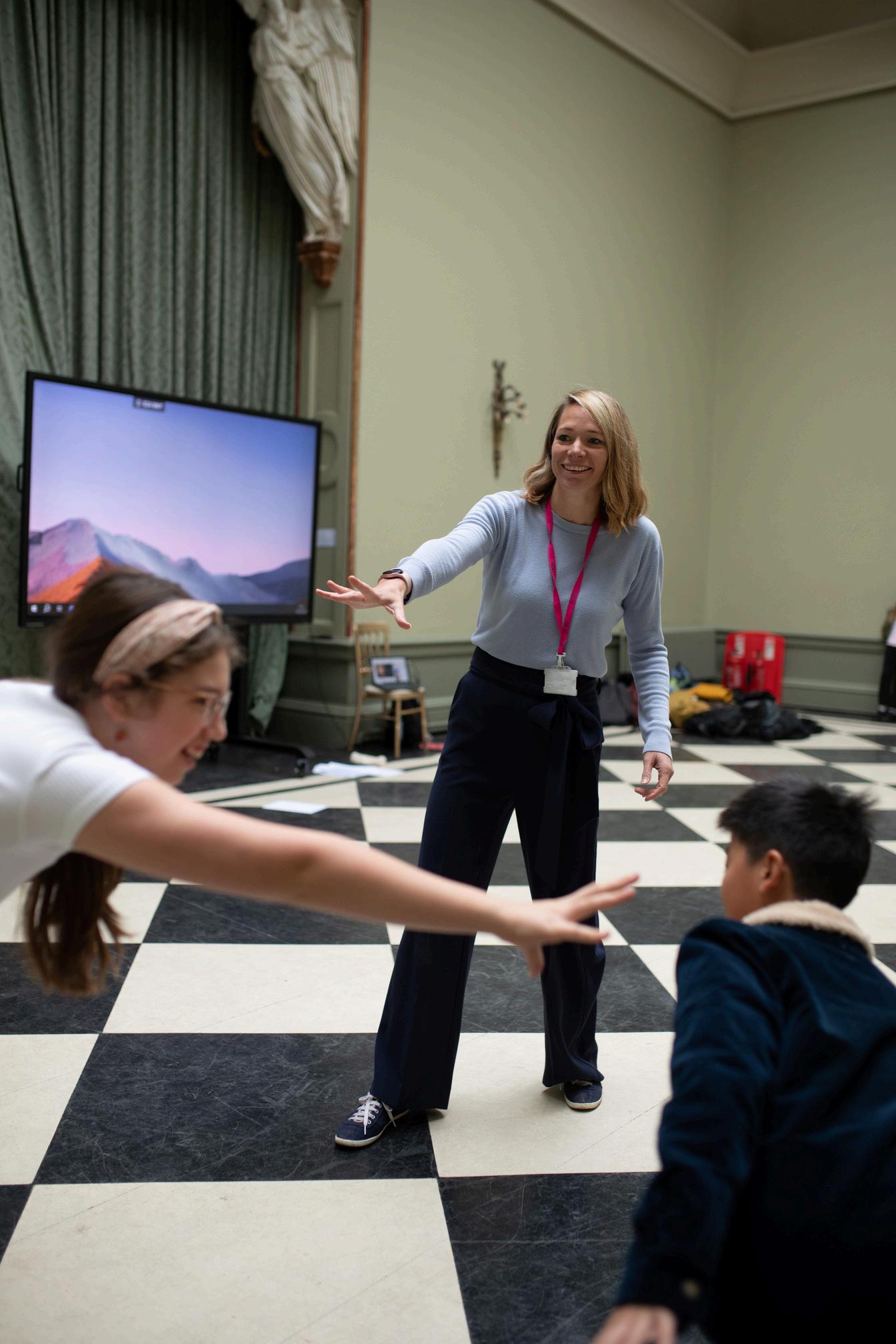

As part of their drama studies, students are working on a performance of a short Shakespeare play, which will be presented to parents on Wednesday 18th June
Through this project, students will develop a deeper understanding of Shakespeare’s plot structures, themes, and characters, while also exploring techniques to bring the language to life for a modern audience. They will refine their performance skills, enhance their confidence in delivering classical text, and learn how to engage an audience through voice, movement, and staging.
This project provides a valuable opportunity for students to connect with Shakespeare’s work in a practical and creative way, building both their interpretative and performance abilities.
How it will be assessed
Creative ideas Students are assessed on their creative ideas, which the teacher assesses through observations in class
Performance: Near the end of Summer term 2 students will perform a short, Shakespeare play for which they will be assessed
What are we studying?
Comedy Techniques
Slapstick
Autumn 1
Mime
Exaggeration
Improvisation
Noughts and Crosses Exploration
Spring 1
Autumn 2
Summer 1
Exploring the themes of the play Noughts & Crosses by Malorie Blackman: racism, friendship and privilege
Learning a range of techniques to bring the play from page to stage
Shakespeare 1: Exploration
Understanding the plot of the play
Exploring themes
Developing characters
Spring 2
Summer 2
are we studying?
Comedy performances and evaluation
Using voice for comic effect
Performing comedic scripts
Analysing the impact of choices
Noughts and Crosses
Performances and Evaluation
Performing small scenes from the play in group
Learning how to use voice, physicality and space to convey character and themes
Evaluate the impact of their Dramatic choices
Shakespeare 2: Performing
Learning lines and blocking
Performing to a live audience
Creating characters

This Summer, Year 8 will be studying The Tempest by William Shakespeare – a play that will take up the entirety of the summer term so that students can analyse it to great depths and finish the whole play in class. The students will be focusing on analytical skills primarily with this text, a skill that they have refined and homed in the Spring term whilst exploring the literary canon. The study of The Tempest will be the students’ first foray into what it means to study an entire Shakespeare play with a critical lens, utilising literary analysis to extrapolate meaning Students will complete a lot of character-based work, considering how certain contexts Shakespeare was drawing on shape meaning. This will culminate in students being able to produce academically rigorous analytical essays on The Tempest, with key understanding of the literary methods Shakespeare is using, and to what effect.
Summer 1 The Tempest: Students will be given an extract from The Tempest and will need to write an analytical essay (minimum three paragraphs) They will be marked on how clear their responses are, their use of quotations, their analysis of writers’ language, and their links to wider ideas, purpose and context
Summer 2 The Tempest: Students will be given an extract from The Tempest and will need to write an analytical essay (minimum three paragraphs) They will be marked on how clear their responses are, their use of quotations, their analysis of writers’ language, and their links to wider ideas, purpose and context English
Term
What are we studying?
Autumn 1 Liccle Bit by Alex Wheatle – creative writing focus
Autumn 2 Liccle Bit by Alex Wheatle – analytical writing focus

continued
Term
Spring 1
Spring 2
What are we studying?
Epic Poetry
Students will explore Homer’s epics The Iliad and The Odyssey, and Virgil’s The Aeneid. They will focus on the following themes:
Love and friendship | Fate | Free will | Honour | The glory of war Rage | Betrayal
Students will practise their comprehension skills and examine the text with a creative lens, producing text transformations and different pieces of transactional writing. The final assessment will be a stylised rhetorical speech from the point of view of Odysseus’s wife Penelope, which will be marked both as a piece of writing and as a spoken performance.
Exploring the canon – character study
Students will be exposed to a range of texts from the literary canon; they will zoom in on key characters including their traits, their actions, and how the wider contexts of the novels contribute to their lives They will focus on the following characters and texts:
Bertha Mason, Jane Eyre Miss Havisham, Great Expectations
The creature, Frankenstein
My Hyde, Dr Jekyll and Mr Hyde Jay Gatsby, The Great Gatsby Winston Smith, 1984
Students will examine extracts from these texts and will continue to develop their analytical writing skills whilst dealing with more challenging nineteenth century texts
The Tempest by William Shakespeare
In Summer 1, students will begin and cover the first half of the play
Students will learn about the context of the play and the time it was written
Students will conduct a detailed exploration of character relationships
Key themes that will be covered:
Summer 1
Summer 2
Fate | Magic and the supernatural | Revenge | Love | Forgiveness Man and monster
Students will continue to develop their analysis skills and in-depth essay writing
The Tempest by William Shakespeare, continued In Summer 2, students will complete and cover the second half of the play
Students will learn about the context of the play and the time it was written
Students will conduct a detailed exploration of character relationships
Key themes that will be covered:
Fate | Magic and the supernatural | Revenge | Love | Forgiveness Man and monster
Students will continue to develop their analytical skills and in-depth essay writing

Year 8 (Perrine’s set)
We will continue our work on Tricolore 2 and start unit 5 The students will find out about cafés in France, learn to buy drinks, snacks and ice creams, they will also learn to describe recent meals They will discuss menus, express likes and dislikes and order a restaurant meal We will focus on the perfect past tense with etre and avoir, regular forms, irregulars, in questions and negative statements For the end of the term, we will analyse a film and talk about cinema
Year 8 (Clarisse’ set)
In the Summer Term, students will delve into unit 8, My school Students will learn about school subjects and will be able to express opinion, they will describe their daily routine on a school day and learn to tell the time In Unit 9, students will discover the marvellous world of French food
Year 8 (Portia’s set)
We will continue our work on Tricolore 2 and start units 5 The students will find out about cafe culture in France, learning to express opinions and order from a menu They will also discover a classic French book or film which we will analyse in the French language, with reference to the grammar and vocabulary we have learnt this year
How it will be assessed:
The four skills (reading, writing, listening and speaking) will be alternatively assessed There will be a test at the end of each unit for all the skills except speaking that will be carried out separately The speaking assessment usually takes place when the teacher feels the students confident enough. Vocabulary tests will be done on a regular basis.

Autumn 1
Autumn 2
Unit 1: In Town
Talk about shops and shopping including what is sold in shops and say how much of something you want to buy
Talk about money and prices, and discuss choices when shopping
Shopping in France
Practise expressing opinions
Practise creative writing
Term
Unit 2: We make plans
Talk about countries in Europe
Learn the names of different countries and continents
Talk about modes of transports and what they are or aren't going to do. the pupils will learn to talk about what they can and cannot do and they will be describing places.
The partitive article
Some -er verbs
Regular -re verbs
Expressions of quantity
Negative form
Regular -ir verbs
Autumn 1
Autumn 2
“to”, “at”, “in” a town, country, continent
The verb “partir”
The verb “venir”
The future with aller (and the negative form)
The verb “pouvoir” + infinitive
The infinitive
In unit 1, the pupils will learn to talk about shops and shopping including what is sold in shops and say how much of something you want to buy they will also learn to talk about money and prices, and they will discuss choices when shopping they will learn about shopping in France and practise expressing their opinions at the end of unit 1 they will practise creative writing
In unit 2, the pupils will talk about countries in Europe, they will learn the names of different countries and continents they will talk about modes of transports and what they are or aren't going to do the pupils will learn to talk about what they can and cannot do and they will be describing places

Term
Spring 1
Spring 2
Summer 1
Summer 2
What are we studying?
In unit 3 we will work on school and routine We will learn how to describe a morning or an evening routine, talk about daily activities, talk about what you do and don't want to do, talk more about school and describe a school trip or a day in a French school Our cultural focus will be to find out about Louis XIV
Unit 4 is about family, we will learn how to describe yourself and others, greet and introduce people, talk about staying with a French family, discuss helping at home, talk about the past, use expressions of time, talk about presents and what you have done recently, describe a visit, talk about choices, talk about television and books, describe a favourite programme or book
In unit 5, we will find out about cafés in France, say what drink we’d like, learn how to buy drinks, food and snacks, describe food and recent meals, understand a short story, say what things did and did not happen, discuss menus, express likes and dislikes and order a restaurant meal
In unit 6, we will discuss travel plans and revise the 24-hour clock, understand and ask for rail information, learn which verbs of the perfect tense need the auxiliary être, talk about air travel, describe a journey and a day out, discuss what we did recently, give our opinion, find out about William the Conqueror, describe a journey in the past and practise creative writing

I5ème :
During the summer term in 5ème, pupils will explore the fantasy genre by reading "The Little Mermaid" by Hans Christian Andersen, which introduces imaginary worlds. They will then create their own magical world, developing their creativity while deepening their understanding of literary genres. In grammar, they will learn to identify and construct noun phrases and revise an essential tense for storytelling: the past simple.
They will also discover the medieval world through heroic figures of the Middle Ages, studying the concept of the hero and their characteristics. By examining the medieval hero and their values, they will see how these ideals have endured over time. Additionally, they will explore the history of words to better understand the evolution of language. In grammar, they will learn to analyse simple sentences, distinguishing between essential and optional components to improve their sentence structure and comprehension skills.
4ème :
During the first part of the summer term in 4ème, students will continue to delve into the evolution of the press during the 19th and 20th centuries, examining its profound impact on society and politics. They will analyse unflattering portraits of journalists, explore the political influence of the press, and understand its role as a powerful tool for justice and truth, exemplified through the Dreyfus Affair. The curriculum also highlights the press as a medium for engagement and resistance, showcasing its significance in historical and modern contexts. Students will deepen their language skills by mastering the mechanism of the passive voice.
In the second part of the term, they will study Émile Zola's novel Au Bonheur des Dames, in which students will discover another way fiction explores reality. Published in 1883, this novel will transport them to a world one hundred and fifty years old, very different from their own. Yet, in many ways, they will see that our modern world still resembles it. While the setting has changed from 1860s Paris to today’s bustling cities, and while fashion and lifestyles have evolved, social relationships remain strikingly similar.
How it will be assessed:
At the end of each unit, students will be assessed on their reading comprehension, grammar skills and writing abilities. They will be asked to write and present one book review on the 14th May.
Y e a r s u m m a r y
Autumn 1
Term
Autumn 2
What are we studying? 5ème
Découvrir des oeuvres poétiques :
« Ondine » d’Aloysius Bertrand ;
« Le Grand Combat » d’Henri Michaux ;
« Littérature » de Robert Desnos« L’Huître » de Francis Ponge ; « La Cimaise et la Fraction » de Raymond Queneau ; « L’Huître » de Francis Ponge.
Lire et réciter un poème.
Revoir les classes grammaticales.
Repérer et accorder un verbe avec son sujet.
Utiliser les temps et les modes.
Connaître les caractéristiques du poème.
Récits d’enfance et d’adolescence :
Découvrir des extraits d’œuvres majeures : Les Aventures de Tom Sawyer de Mark Twain, Un bon petit diable de la comtesse de Ségur, La Gloire de mon père de Marcel Pagnol, Moi, Boy de Roald Dahl, La Promesse de l’aube de Romain Gary, Autobiographie d’une courgette de Gilles Paris.
Analyser les rapports entre l’enfant (ou l’adolescent) et le monde qui l’entoure.
Découvrir le registre comique.
Découvrir plusieurs procédés littéraires.
Approfondir la connaissance des genres littéraires.
Revoir les principes fondamentaux de la construction syntaxique avec la phrase simple et la phrase complexe.
Revoir des temps indispensables à la construction du récit : le présent et le passé simple de l’indicatif.

Term
Spring 1
Spring 2
Summer 1
Summer 2
What are we studying? 5ème
Découvrir des œuvres et des textes relevant de l’épopée, du roman et de la bande dessinée :
L’Iliade et l’Odyssée d’Homère ; L’Énéide de Virgile ;
L’Île au trésor de R L Stevenson ; Des extraits d’albums de Tintin d’Hergé ;
Hunger Games de Suzanne Collins
Découvrir la notion de héros et d’action héroïque
Approfondir la connaissance des genres littéraires
Connaître les caractéristiques de la bande dessinée
Revoir un des temps indispensables à la construction du récit : l’imparfait
Repérer et employer l’adjectif qualificatif
Découvrir et lire une comédie de Molière : Les Fourberies de Scapin
Jouer un personnage de théâtre
Découvrir les différents types de comique
Approfondir la connaissance du genre théâtral
Reconnaître et employer le subjonctif présent
Reconnaître et employer l’impératif
Lire un conte merveilleux qui propose la représentation de mondes imaginaires : « La Petite Sirène » de Hans Christian Andersen Imaginer un monde relevant du merveilleux
Approfondir la connaissance des genres littéraires
Reconnaître et construire des groupes nominaux
Revoir un temps indispensable à la construction du récit : le passé simple
Découvrir le monde médiéval grâce à des figures héroïques du Moyen Âge
Approfondir la notion de héros et ses caractéristiques
Inscrire le héros médiéval et ses valeurs dans une permanence
Jouer avec le lexique et son histoire pour comprendre notre langue
Savoir analyser la phrase simple en utilisant les notions de constituants facultatifs et obligatoires Y

Y e a r s u m m a r y
Term
Autumn 1
Autumn 2
Spring 1
Spring 2
Summer 1
Summer 2
Year 8 Curriculum Overview
Summer Term 2025
What are we studying? 4ème
Pièce de théâtre : Le jeu de l’Amour et du Hasard, Marivaux
Pièce de théâtre : Le jeu de l’Amour et du Hasard, Marivaux
Nouvelle fantastique : Le Horla, Maupassant
L’évolution de la presse au XIXe et XXe siècle
Découvrir des portraits peu flatteurs de journalistes
Mesurer l’influence de la presse en politique
Comprendre, grâce à l’affaire Dreyfus, que la presse peut être un outil efficace au service de la justice et de la vérité
Voir que la presse peut servir l’engagement et la résistance
Découvrir le mécanisme de la forme passive
L’évolution de la presse au XIXe et XXe siècle
Le genre naturaliste : Au Bonheur des Dames, Zola
Le genre naturaliste : Au Bonheur des Dames, Zola

AThis Summer Term, our Geography curriculum will focus on the topic of a Local School Enquiry, where students will develop essential skills in conducting a full geographical investigation. They will learn how to plan, carry out, and evaluate a geographical enquiry from start to finish, using our school and its surrounding area as a case study. Through this hands-on approach, students will explore key concepts such as data collection, map skills, analysis, and presenting findings, while also considering the human and physical features of our local environment This topic will not only deepen their understanding of geography but also encourage critical thinking, teamwork, and critical thought. Students will then complete a short topic in summer 2 exploring sustainability principles, on the topic of ‘How sustainable is Glastonbury festival?’. Students will investigate social, environmental and economic impacts of festivals and link this to environmental awareness started in the Climate Change topic in Spring
How it will be assessed
Two assessments will take place on this piece of work, the first will be a theory test on geographical enquiry components to assess understanding of the core principles of enquiry, before their final assessment where students will present their investigation and findings to the class in a presentation style format No assessment on Glastonbury as this will be covered leading up to the final year examinations

Term
What are we studying?
Autumn 1 Focus: ‘How has geography influenced extreme sports?’
Autumn 2 Focus: ‘What lies in my Frappucino?’
Spring 1 Focus: ‘Do the push factors outweigh pull factors for international migration?’
Spring 2 Focus: ‘How dangerous is climate change?’
Local school enquiry with a focus on environmental awareness
Students will build on their understanding of geographical enquiry from year 7 by designing and carrying out an investigation within school
Summer 1
Summer 2
·Understanding how to curate appropriate and achievable an enquiry question rooted in geographical theory.
·Learn how to design and carry out suitable surveys using Survey123 and using appropriate sampling strategies to ensure reliable, but representative data.
·Carry out basic data analysis using mathematical skills such as averages, ranges and percentages to inform conclusions.
·Present data using a range of techniques to help identify trends and draw meaningful conclusions.
Focus: ‘How sustainable is Glastonbury festival?’
Students will be introduced to the concept of climate change and sustainability by exploring the logistics behind a large-scale festival and consider its environmental impact:
Understanding environmental issues associated with festivals and the concept of climate change.
Describing resource security both locally and globally
Describing and explaining the issues of waste, power and transport covering social, economic and environmental challenges.
Being able to calculate and explain their carbon footprint and its importance to environmental sustainability.
Describing corporate sustainability and exploring positive and negative examples. Understanding the impact of consumption of meat and dairy on climate change. Putting forwards solutions to issues impacting global sustainability.

Students will be immersed in British, European and world history, examining societies in depth across the medieval, early modern and late modern eras. Each study begins in the medieval and takes a longitudinal approach to help students understand the world around them today. They will explore the roots of modern-day China, Russia, Ukraine, India, America, and Britain, considering power, ordinary lives, beliefs and cultural encounters.
Students will complete in-class assessments, including essay writing, source analysis, and interrogating historians’ interpretations Essay writing will challenge students to communicate arguments about historical concepts, such as causes or consequences Source analysis will challenge students to critically evaluate materials from the past, explaining what we can learn from those materials and why they are valuable. Interrogating interpretations requires students to support and challenge views with evidence to test their credibility Assessments will take place throughout both half-terms, giving students opportunities to learn, apply, reflect and then practise again at regular intervals

Term
Autumn 1
Autumn 2
Spring 1
Spring 2
Summer 1
Summer 2
What are we studying?
Is Martin Sixsmith right about the ‘culture, beauty, and embryonic democracy’ of Kievan Rus?
How useful are primary chronicles for finding out about the beginnings of Kievan Rus?
How successful was the rule of Oleg the Wise? Was Kievan Rus really a democratic state?
Why do Russia and Ukraine want to claim Anne of Kiev as their own?
Why do historians disagree about the consequences of the Mongol invasion?
How accurately does Eisenstein’s depict the events of 1242? Are any films about Russia and Ukraine reliable?
What can the Moscow Kremlin tell us about the origins of Muscovy?
Was China under the Tang Dynasty really ‘the greatest civilisation on earth’?
What can paintings tell us about the Tang Dynasty?
Why was Xuanzang’s journey to India so important?
What impact did trade along the Silk Roads have on the Tang Dynasty?
What can the city of Chang tell us about life under Tang rule?
Does Empress Wu deserve her reputation as a ruthless murderer?
Were the Tang emperors to blame for the collapse of the dynasty?
Overview: How and why did religious and political ideas change 1500-1800?
Why did Martin Luther's ideas go viral?
How should we tell the story of Richard Whiting's execution?
Why was St Winifred's Church vandalised and when?
How were ordinary people affected by the English Reformation?
What can a print tell us about ordinary life in the 1640s?
Why was the world turned upside down by the English Civil War?
What was the significance of the English Civil War?
Why do historians disagree about Oliver Cromwell?
Why was there a power shift in English political thought in the 18th Century?
Was Blackadder right about 18th Century elections?
Shifts in power: worlds of difference in 17th Century America and Britain


Year 8 Curriculum Overview
Summer Term 2025
In the spring term year 8 will be moving to Latin to GCSE Chapter 7 and 8. We will continue to explore the passive voice for the imperfect, future, and present tense verbs and types of participles. Students will continue to expand their comprehension and translation skills exploring the stories of Roman Heroes and heroines: Horatius and Mucius Scaevola, Cloelia and Coriolanus
How it will be assessed
Students will be assessed on vocabulary knowledge 20-5 words per week There will be half termly comprehension and translation tasks to assess their vocabulary and syntactical knowledge They will sit the Entry Level Award language papers in May
Autumn 1
Spring 1
Aeneas and the Roman Future
Personal pronouns and possessive adjectives
Future tense of ‘sum’ and ‘possum’
Adverbs from adjectives and temporal adverbs
From Aeneas to Romulus: The Roman kings third person subject and object pronouns third person subject and object possessives
Roman Heroes: Horatius and Mucius
Scaevola
Comparative and superlative adjectives
Passive voice verbs (imperfect, future and present)
Cloelia and Coriolanus
Future, present and perfect participles.
Negative and irregular imperatives.
Autumn 2
Spring 2
Sabine Women and the Ascension of Romulus
Pluperfect tense of regular verbs
Pluperfect tense of ‘sum’ and ‘posse’
The reign of King Numa Eo – to go (all tenses)
Prefixes and compound verbs: all 5 active tenses
Tarquinius Superbus - last king of Rome
The rise of the Roman Republic.
Cincinatus and the Verginia
Perfect and pluperfect passive verbs
If clauses
The Gauls approach self and same to want, to not want, to prefer (velle, nolle, malle)
Defending Rome ferre, offere, auferre, tolle and compounds in active and passive voice
Summer
Hannibal and the Third Punic War
Hannibal Crosses the alps with Elephants
deponent and semi-deponent verbs
passive infinitives and indirect statements with infinitives
Hannibal and Scipio
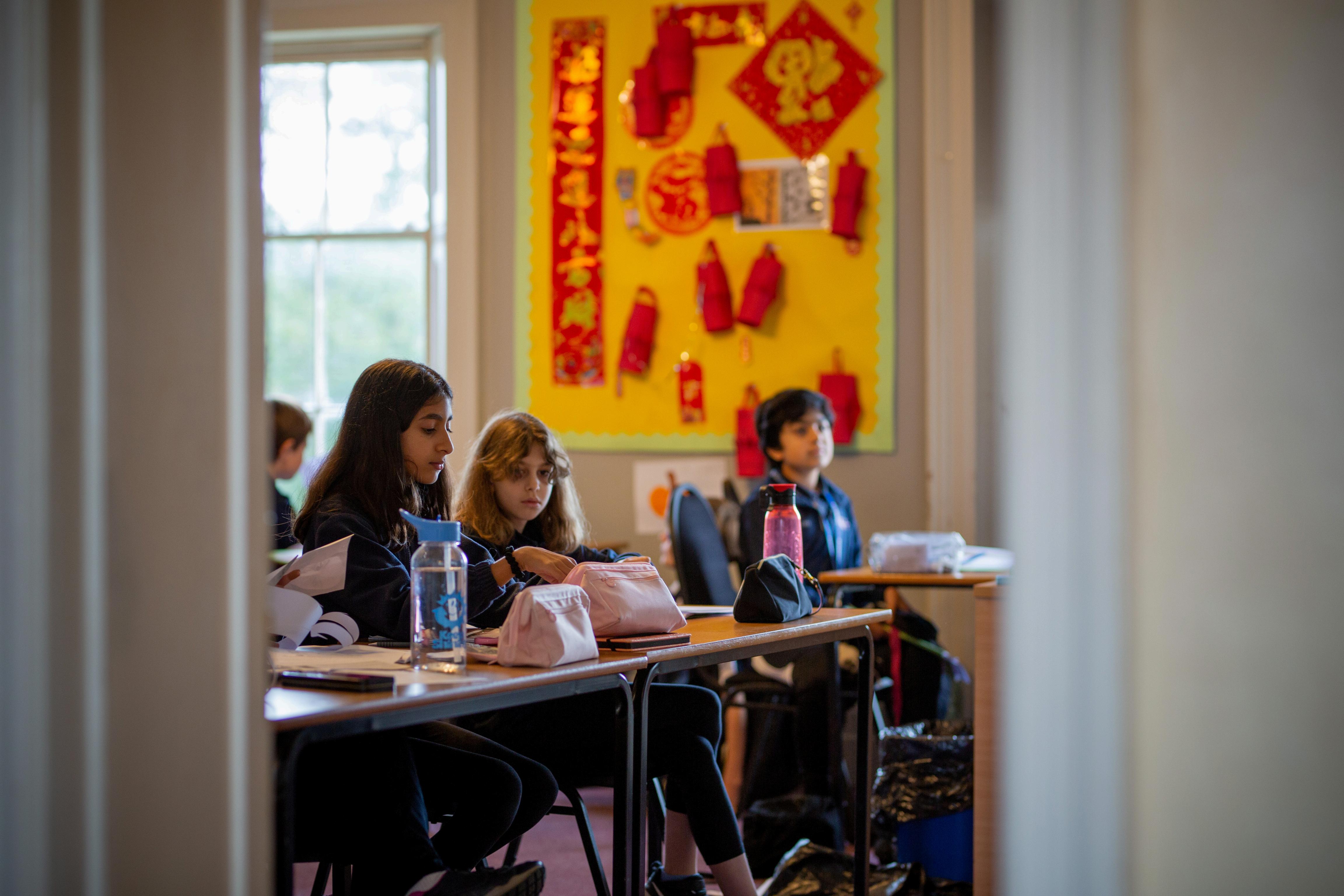

During the Summer term, Year 8 Mandarin students will begin with the topic "Travel in China," where they will learn to talk about seasons and directions, discuss travel plans, and explore key destinations such as Beijing, Xi’an, and Shanghai. They will also develop their ability to understand tourist information and gain a deeper insight into Chinese festivals. Additionally, students will have the opportunity to learn about and experience Duan Wu Jie (Dragon Boat Festival), learning about the festival's history and traditions, and participating in cultural crafts and storytelling This term will provide an exciting experience, enhancing both their language skills and cultural understanding.
How it will be assessed
In addition to having a weekly vocabulary test, students will have an exam after each half term that will include listening, reading, translation, and writing exercises They will also have an oral exam to familiarise themselves with the format of the final exams
Autumn 1
Spring 1
JB2 Ch3 Where do you live?
Talking about place in a town
Learn to use relative place words
Using future time phrases to talk about weekend plans
JB2 Ch4 Shopping
Buying fruit and vegetables
Talking about buying clothes
Using the present continuous
JB2 Ch5 Travel in China
Learning to say the seasons and directions
Autumn 2
Spring 2
Summer 1
Talking about visiting Beijing
Understanding tourist information
Summer 2
Describing your house using comparisons
Talking about jobs and what you would like to do in the future
Learning more about living in China and aspect of life that has changed over time
Talking about online shopping
Learning about shopping in China and explore the customs and culture
Revision and exam
Buying souvenirs
Learning about the Chinese New Year
Learning more about Chinese festivals


Throughout Year 8 students have broadened their mathematical understanding with a wide range of topics in all areas of mathematics: number, algebra, shape and space and data handling In the first half of Summer they will study the following topics:
Calculator Skills: an important topic as the IGCSE requires expert understanding of how to use the calculator to its fullest Students should all be bringing in a scientific calculator to make the most of this topic
2D and 3D Images: representing 3D shapes in 2D using isometric drawing and nets and plans and elevations
Average and Range: understanding how to interpret different measures of central tendency and spread to understand datasets
Volume and Surface Area: specifically volume and surface area of all shapes with constant crosssections such as cubes, cuboids, cylinders and other prisms Students will revise areas of basic shapes during this topic
The second half of the term will be dedicated to revising the year ’ s content in advance of the students’ end of year exams
How it will be assessed
Students will sit two 45 minute written assessments at the end of the term They will also have continuous assessment through low-stakes mini-tests, so that they can track their progress and what areas of development they might need to work on
Autumn 1
Spring 1
Summer 1
Percentages and Money
Indices
Equations
Index Laws
Equations of Straight Lines
Sequences
Metric Conversions
Calculator Skills
Nets
Averages and Range
Autumn 2
Spring 2
Sequences
Ratio
Ratio
Constructions and Loci
Probability
Summer 2
Volume and Surface Area
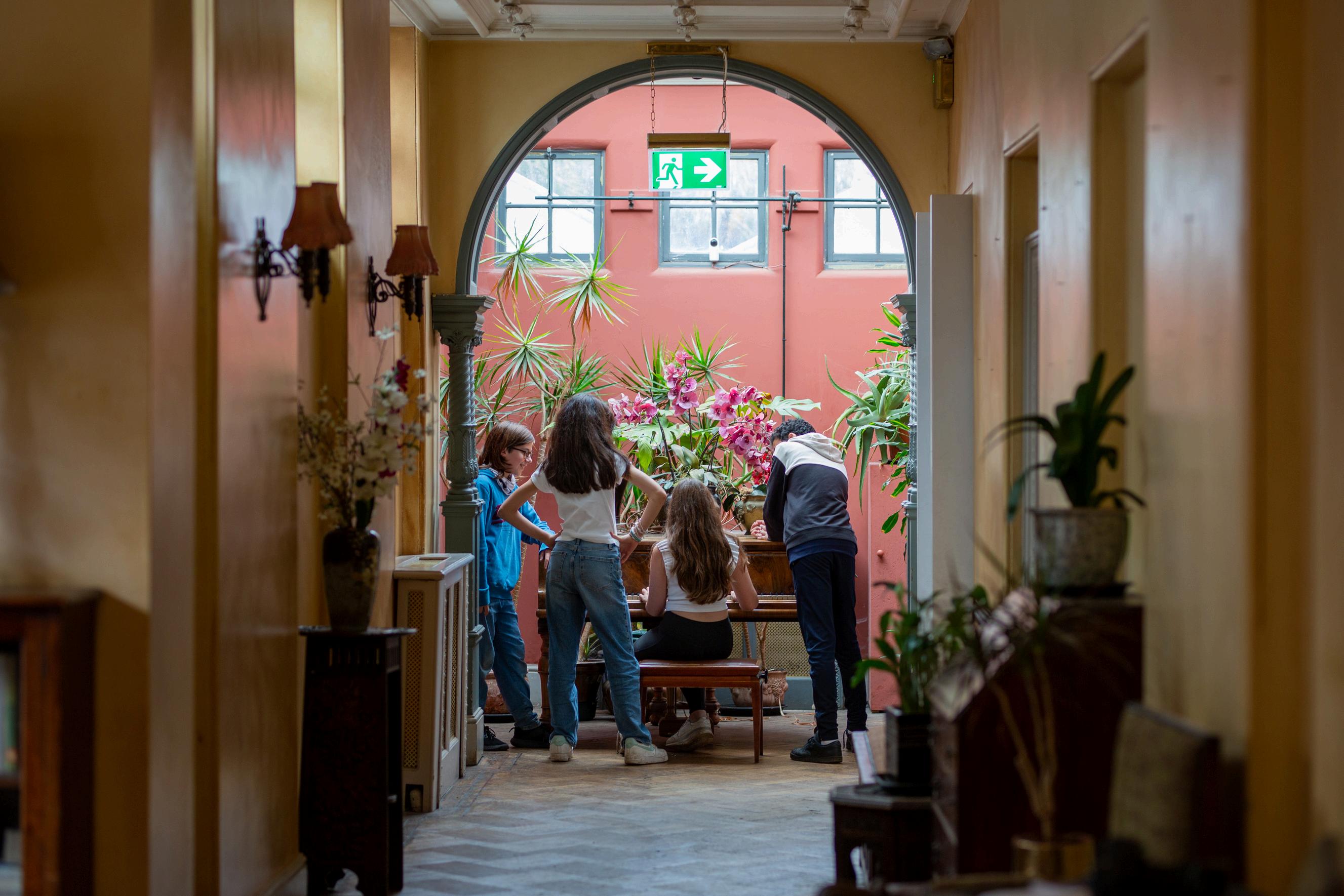

Year 8 Curriculum Overview
Summer Term 2025
Writing a pop song.
To introduce students to the structure, melody, harmony, and lyrics of pop songs, enabling them to compose and perform their own original pop songs They will, Identify the key sections of a pop song, develop lyricwriting skills based on a theme or emotion Compose a catchy melody using simple scales and patterns
Learn common pop chord progressions and how to use them and develop accompaniment patterns and rhythmic grooves They will also select and perform song for the HCH Shakespeare Arts Festival
How it will be assessed
Formative: Participation in songwriting exercises, creativity in lyric writing, melody composition attempts
Summative: Final song performance, self-evaluation, and feedback from peers
Autumn 1
Spring 1
Theme and Variations:
Analysis of well-known themes and variations
Study of the musical elements to change a musical theme
Playing well known themes on the keyboard
Creating own variations on a well-known theme
Blues and Jazz:
The origins of blues
Listening and analysing to famous blues pieces
Playing the 12-bar blues chord progression and walking bass Improvisation using the blues scale
Listen to and analyse popular songs, identifying verses, choruses, bridges, and intros/outros.
Autumn 2
Summer 1
Write their own lyrics, focusing on creating a strong hook for the chorus.
Experiment with playing progressions and fitting their melodies and lyrics to them.
Songs for the HCH Shakespeare Festival.
Spring 2
Christmas Song Arrangements:
Tech Lab skills using Logic Pro
Recording a well-known Christmas Carol into Logic Pro
Remixing, using premade and own loops
Music editing skills
Summer 2
Preparing for blues performance
Blues influence on other genres: jazz and modern music
Recording blues compositions in the Tech Lab using Logic Pro
Improve performance and song delivery.
Perform the completed song and evaluate the process.
Songs for the HCH Shakespeare Arts Festival
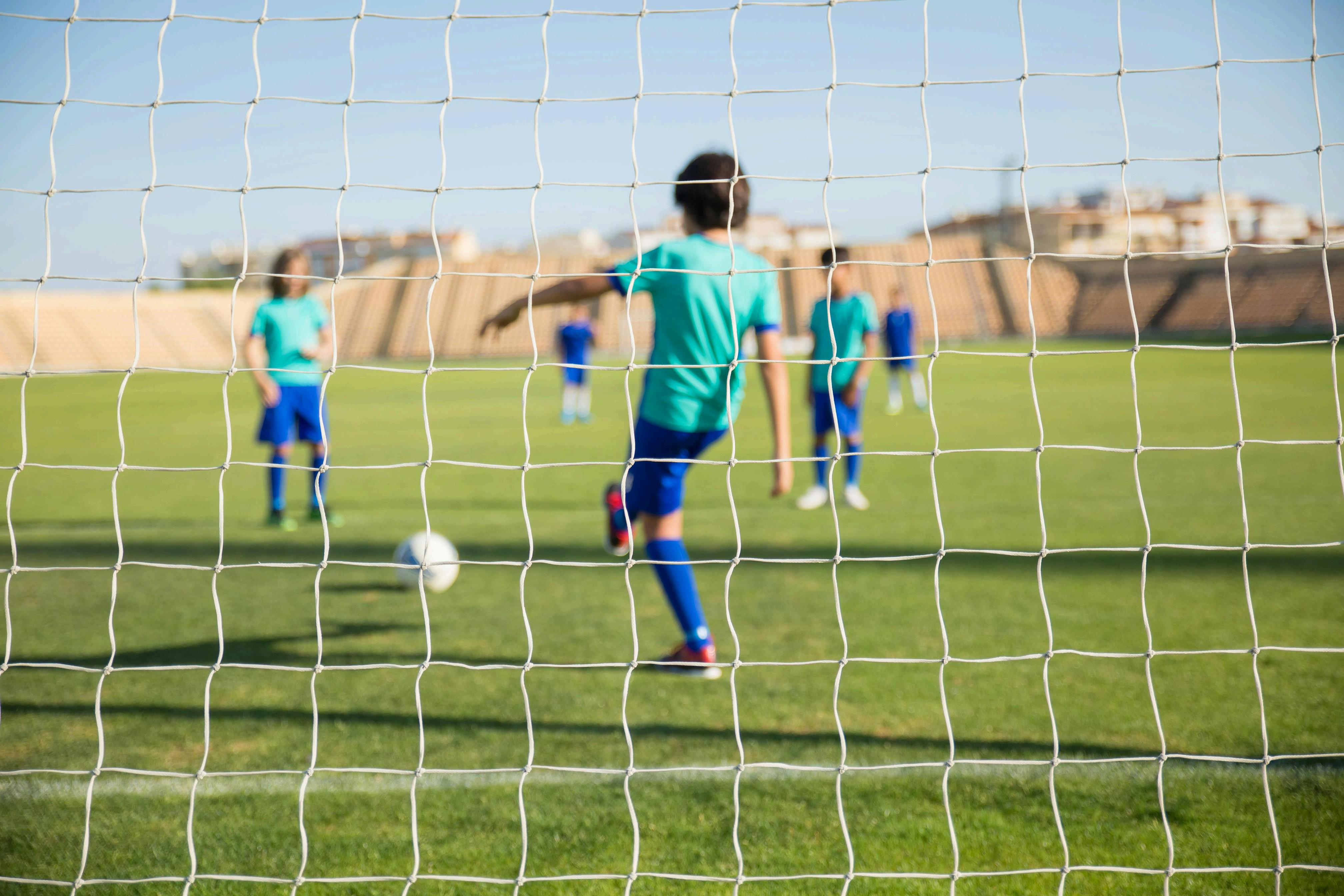

In the summer term, Year 8 students will engage in off-site instruction at the Elmbridge Xcel Leisure Complex and the Weir Archer Athletics Centre in Kingston, allowing them to take advantage of the excellent athletics facilities available. The curriculum is designed to prepare students for optimal performance during their house competitions at sports day, scheduled for the end of June at the Elmbridge Xcel Leisure Complex. Training will include sprints at various distances, relays, shot put, discus, javelin, long jump, triple jump, and high jump. Students will enhance their skills through sports-specific warm-ups and collaborative exercises aimed at refining their techniques for the events they will participate in. A strong focus will be placed on personal growth and team support, fostering a culture of resilience and sportsmanship that aligns with the values of Hampton Court House.
During on-site lessons, students will participate in rounders, where they will develop their skills in bowling, batting, fielding, and base running through small-sided activities and gameplay.
How it will be assessed
Speed and Sprinting: Analysis of acceleration, peak speed, and pace maintenance in short sprints.
Endurance and Stamina: Evaluation of sustained pacing over longer distances and overall cardiovascular health.
Strength and Power: Assessment of muscular strength and explosive power in events such as shot put, discus, and jumping.
Technique and Form: Evaluation of posture, stride, and efficiency in running, jumping, or throwing to enhance performance and prevent injuries.
Batting Technique: Proficiency in striking the ball, placement accuracy, and timing. Bowling Accuracy: Consistency and effectiveness in ball placement by the bowler. Running and Decision Making: Speed, agility, and strategic decision-making on the field.
Teamwork and Communication: Effectiveness in collaboration and communication among team members.
Term
Autumn
Spring 1
Spring 2
Summer
What are we studying?
Football: Passing, shooting, dribbling, heading, goalkeeping and attack vs defence.
Netball: Passing, shooting, attack vs defence, positions & conditioned games.
Padel tennis: Rules, service, shots, tactics and tournaments.
Basketball: Passing, shooting, dribbling, tactics, attack vs defence. Golf: putting, driving, mini golf and house tournament.
Basketball: Passing, shooting, dribbling, tactics, attack vs defence.
Indoor climbing: safety, tactics, body weight exercises, competitive climbing tasks.
Golf: putting, driving, mini golf and house tournament.
Athletics: 4 x 100m relay race, 100m race, 200m race, 400m race, 800m race, shot-put throw, javelin throw, discus throw, long jump, triple jump and high jump.
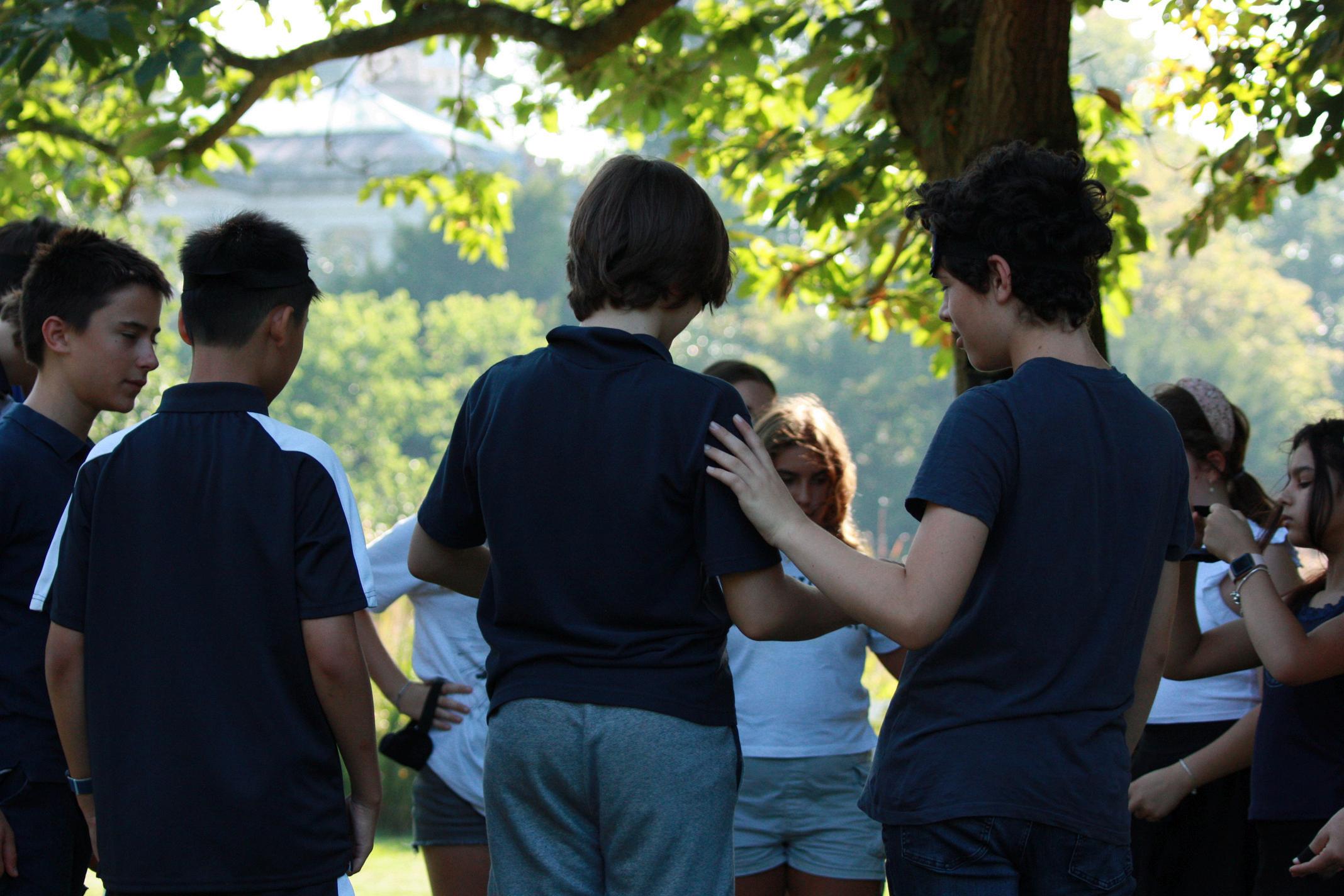

TAll students from Y7 – 11 will focus on two main topics ‘Healthy Body and Healthy Mind’. Each year group will work in a manner appropriate to the year group, exploring age-appropriate ideas and resources
In summer 1, our PSHE curriculum will focus on cultivating a "Healthy Body," where students will explore the fundamentals of nutrition, exercise, and personal hygiene. Through engaging activities and discussions, they'll learn how to make informed choices about their physical health, understand the importance of a balanced diet, and recognise the benefits of regular physical activity.
Moving into summer 2, the focus will shift to "Healthy Mind." Here, students will delve into topics such as emotional wellbeing, stress management, and the importance of mental health Interactive lessons will equip them with strategies to maintain a healthy mindset, improve their emotional resilience, and understand the value of mindfulness and positive thinking. This holistic approach aims to empower students with the knowledge and skills to lead balanced, healthy lives both physically and mentally.
We aim to make all PSHE sessions as relevant to the students and their current needs and concerns, therefore out content is changeable, and suggestions and feedback are welcome at any time from students and parents
How it will be assessed
PSHE lessons are predominantly discussion based, with some written tasks for deeper comprehension and application At the end of each half term, the students will complete self-reflection sheets for teachers to monitor understanding and adapt future teaching
we studying?
Living in the Wider World: Communication skills
Managing my behaviour
Autumn 1
Spring 1
Summer 1
Personal development and target settings
Careers and employment skills
Income and expenditure
Relationships and Sex Education:
Healthy behaviours in relationships
Gender and stereotypes
Homophobia
Prejudice
Healthy Body
Exploring essential nutrition and the benefits of a balanced diet.
Engaging in physical activities and understanding their impact on health.
Learning about personal hygiene and its role in maintaining health.
Autumn 2
Tolerance and anti-racism
Dangers of extreme leaders
Preventing radicalisation and extremism
Spring 2
Summer 2
Consent
Contraception
The dangers of pornography and ‘sexting’
STI’s
Healthy Mind
Identifying emotions and effective stress management techniques.
Practicing mindfulness and positive thinking to enhance mental wellbeing.
Developing strategies for building resilience and emotional strength
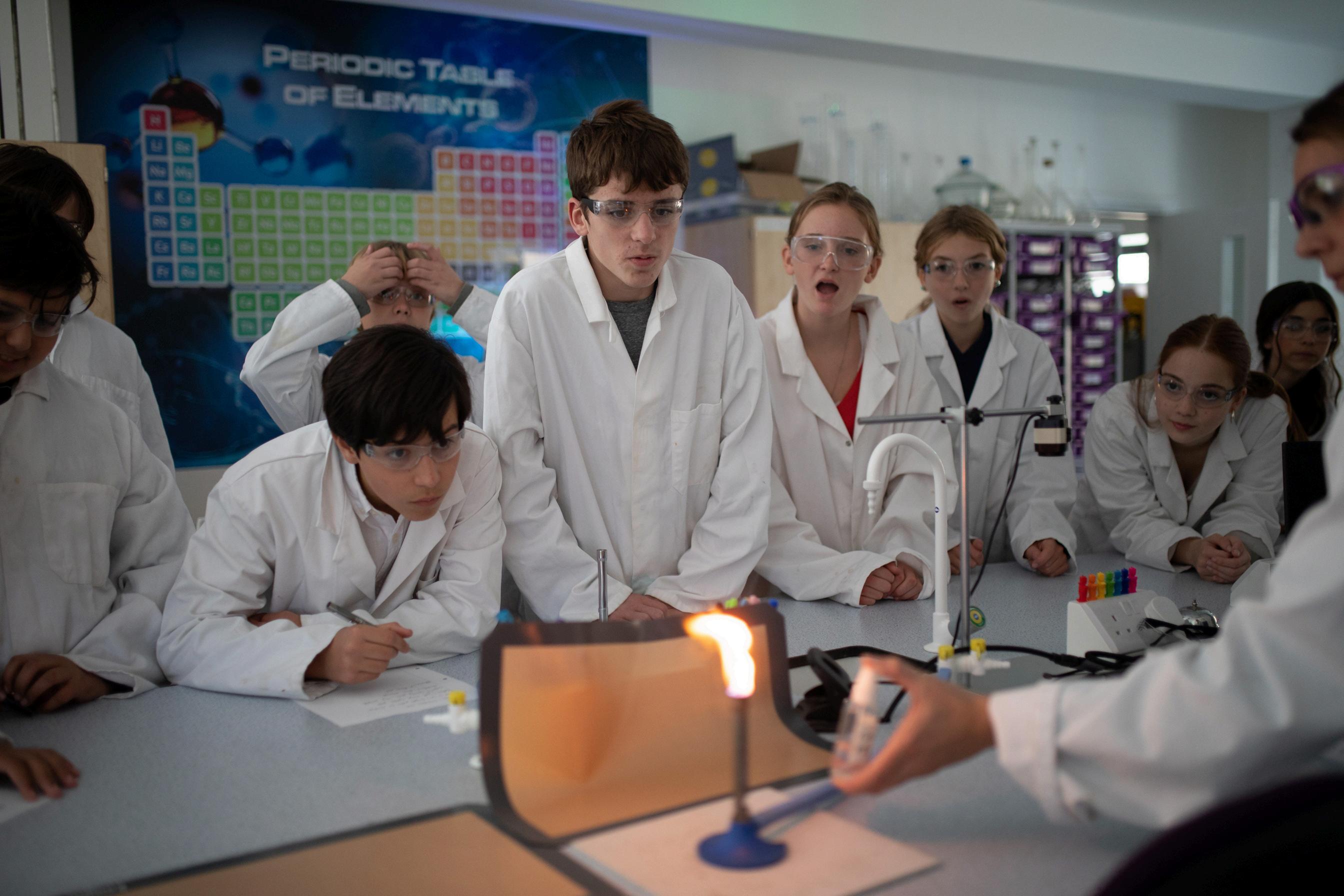

In the Summer term of 2025, the students will cover the following key topics key topics: Chemical Reactions, Separation Techniques, Energy, Ecosystems and Adaptations as well as Metals.
1
Chemical Reactions – Elephant Toothpaste: Students mix safe ingredients to create a foamy reaction, learning how chemicals produce gas and heat. They observe rapid changes and discuss why reactions occur.
2 Energy – Insulation Investigation: Students test materials (e.g., foil, cotton wool) to see which keeps water warmest, linking to how insulation conserves energy in homes.
Separation Techniques – Rock Salt: Kids dissolve a salt-sand mixture, filter out sand, and evaporate water to recover salt crystals, demonstrating how scientists purify materials.
3 Ecosystems & Adaptations – Bird Beak Buffet: Using tools as “beaks,” students collect different foods to explore how animal adaptations help them survive in their habitats.
5
4 Metals – Displacement Reaction Race: Students safely test metals in acid to see which react fastest, introducing the concept of metal reactivity and real-world uses.
The textbook we are using this year is an online textbook using the Kerboodle platform. Students have been shown how to log in and access this during last term.
How it will be assessed
Approximately each half term there will be a mini test on the topics covered that half term or term. These will take place during normal lessons and will be timed to coincide with the ending of topics, so may not be exactly at the end of each half term. At the end of the year there will be an end of year exam covering all the topics looked at over the whole year. This will be during the school’s assessment week and will be a longer exam.
Autumn
The Periodic Table
and Periodic Table test Autumn 2 Health The Periodic Table
Electricity and Magnetism
Biological Processes
Spring 1
Summer 1
Electricity, Magnetism, and Biological Processes Test
Energy
Ecosystems and Adaptations Metals
Ecosystems, Adaptations and Metals test
Spring 2
Photosynthesis
Chemical Reactions
Separation Techniques
Photosynthesis test, Separation Techniques and Energy Test
Summer 2 Metals
Ecology Project End of Year exam

Year 8 Curriculum Overview
For the end of this academic year 2024-2015, Year 8 Students will be following the topic 4 and 5 from the book Viva 2.
Unit 4: Interests and Free Time:
During the half term 5, students have explored how to discuss their hobbies, sports, and musical preferences They have learned to talk about their favourite activities, the sports they play or follow, and the music they enjoy, while also developing their ability to express personal opinions on these topics
Additionally, they have been introduced to the past and future tenses, allowing them to describe past hobbies and discuss future plans with greater accuracy
Unit 5: summer holidays:
And on the last half term with this unit, students will learn to describe their usual summer holiday activities, including accommodations such as hotels and resorts They will also develop skills in asking for and giving directions, discussing summer camps, and ultimately delivering a presentation that integrates the past, present, and future tenses to talk about their summer holiday experiences
How it will be assessed
When it comes to assessing this part and ensuring that students have acquired the appropriate knowledge on the topic, they will have a written exam that includes reading, listening, translations, and writing sections
Term
Autumn 1
What are we studying? Stream 1
“ Mi familia y yo” (My family and I)
Description of myself and members of my family
Comparatives - Who do I look like?
Relationships: To get on well with And reasons
Things you like to do with your family
“En mi tiempo libre/Mis pasatiempos” (Hobbies)
Things you like to do and reasons
Things you do depending on the weather
Sports
Adverbs of time
What are we studying? Stream 2
“ Mi familia y yo” (My family and I)
Description of myself and members of my family
Comparatives - Who do I look like?
Relationships: To get on well with And reasons
Things you like to do with your family

continued
Term
Autumn 2
Spring 1
Spring 2
Summer 1
Summer 2
What are we studying? Stream 1
“Todo sobre mi vida” (All about my life)
What do you use your phone for?
Music
TV programmes and cinema
Past tense
Things you did recently
Revision of the whole topic
“ En el restaurante” (At the restaurant)
Meals during the day
Understanding the menu
How to order at the restaurant
Near future (I´m going to have )
Things you are going to buy
Using three tenses together
Improving how to get opinion
Revision
“Planes con los amigos” (Plans with friends)
Arranging to go out
Querer/poder
Getting ready Using reflexive verbs
Clothes
Events
Revision
“De compras” (Shopping)
Shops and items
What you have in your city
And what you would like to have
Problems at the shops and solutions
Revision of the whole year material for the end of year assessment
What are we studying? Stream 2
“En mi tiempo libre/Mis pasatiempos” (Hobbies)
Things you like to do and reasons
Things you do depending on the weather
Sports
Adverbs of time
Revision of the whole year material for the end of year assessment Year 8 Curriculum Overview
“ Todo sobre mi vida” (All about my life)
What do you use your phone for?
Music
TV programmes and cinema
“Todo sobre mi vida” (Part 2)
Past tense
Things you did recently
Revision of the whole topic
“En el restaurante” (At the restaurant)
Meals during the day
Understanding the menu
How to order at the restaurant
Near future (I´m going to have )
Things you are going to buy
